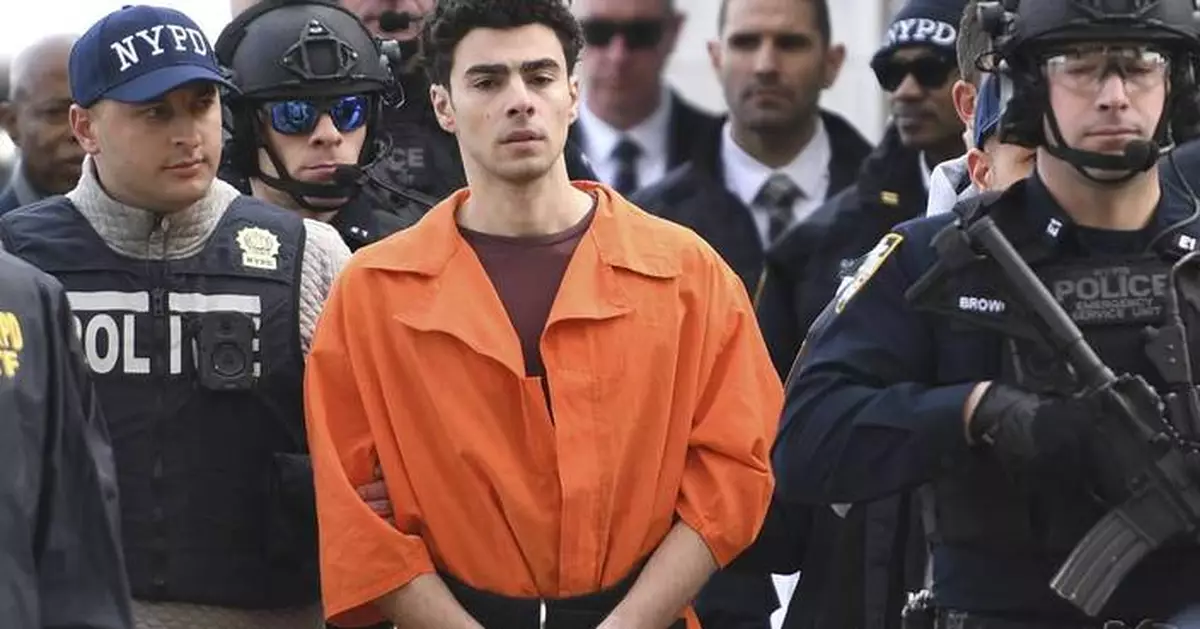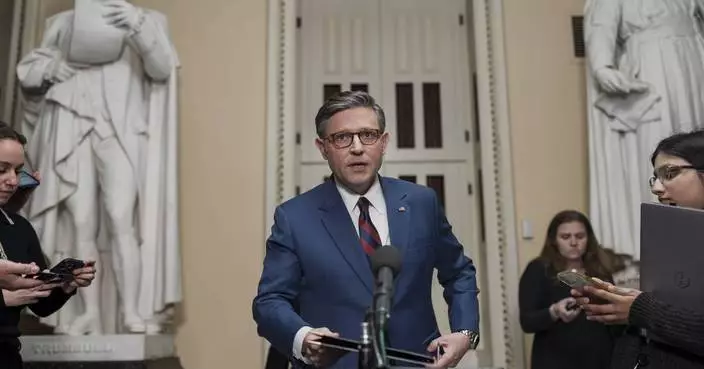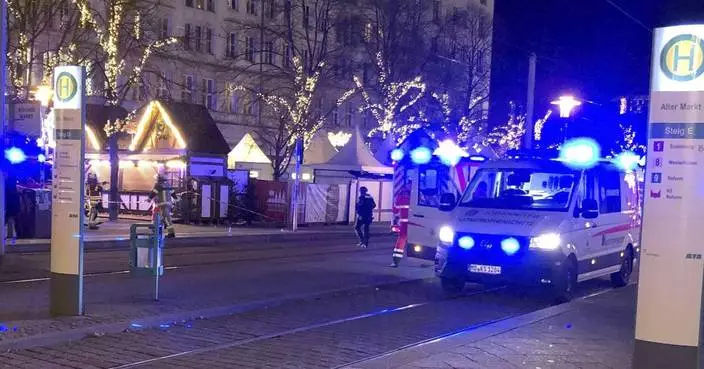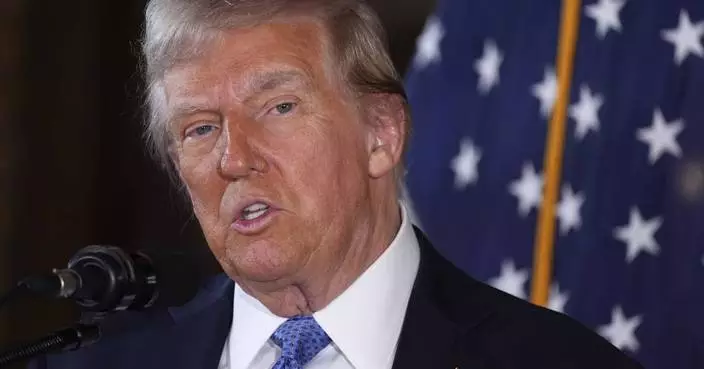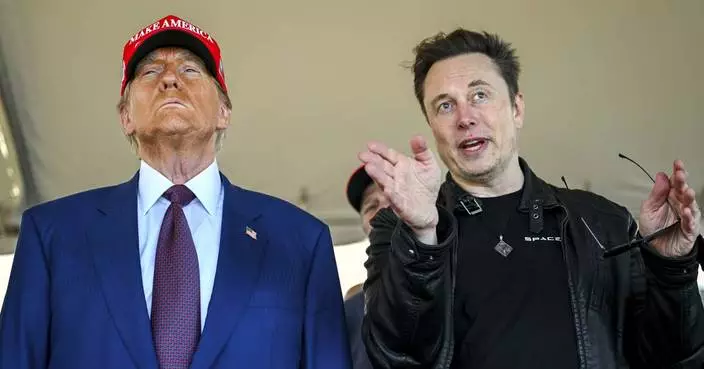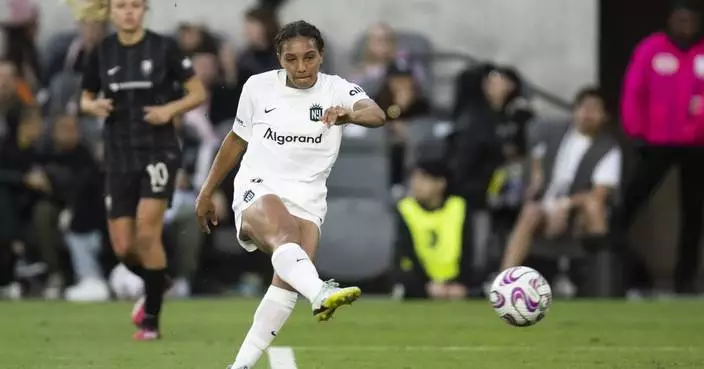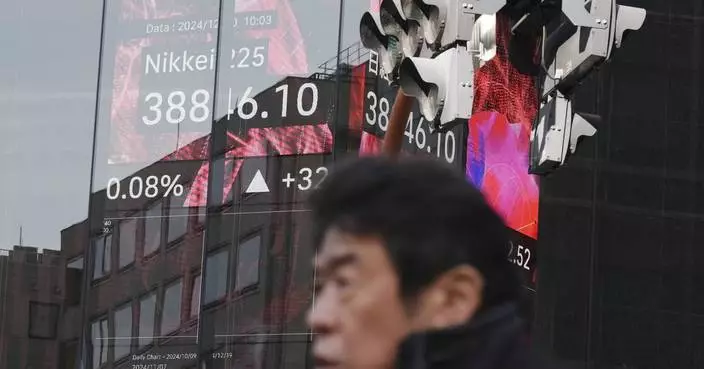NEW YORK (AP) — The man accused of gunning down United Healthcare’s CEO outside a Manhattan hotel is now jailed in New York, awaiting arraignment Monday on a state murder indictment after he was returned to the city in dramatic fashion to face charges in multiple courts.
Shackled and wearing an orange prison jumpsuit, 26-year-old Luigi Mangione was escorted Thursday by heavily armed police officers and whisked by air from Pennsylvania to Manhattan, where he appeared in a packed courtroom on federal charges that could bring the death penalty.
The Ivy League graduate, who prosecutors say inveighed against the health insurance industry and wealthy executives in his writings, was not required to enter a plea to federal charges of murder, stalking and firearms charges in the Dec. 4 killing of Brian Thompson. The state indictment charges Mangione with murder as a terrorist act.
Here’s what’s next in the cases:
Mangione is being held without bail at Metropolitan Detention Center, the same federal jail where hip-hop mogul Sean “Diddy” Combs and cryptocurrency fraudster Sam Bankman-Fried are currently detained.
The notorious Brooklyn facility, the only federal lockup in the city, has been variously described as “hell on earth” and an “ongoing tragedy” because of deplorable conditions, rampant violence, dysfunction and multiple deaths.
The federal Bureau of Prisons has said it is increasing staffing to make up for staggering shortfalls, but conditions have been so stark at the jail, which houses about 1,100 inmates, that some judges have refused to send people there.
Besides the federal charges filed Thursday, Mangione must still answer to a state murder indictment.
Manhattan District Attorney Alvin Bragg’s office charged Mangione with murder as an act of terrorism, which carries a maximum sentence of life in prison without parole. He is also charged with state weapons offenses and possession of a fake ID.
Prosecutors have said the two cases will proceed on parallel tracks, with the state charges expected to go to trial first.
Mangione’s lawyer, Karen Friedman Agnifilo, argued in court Thursday that the terrorism allegations in the state case and stalking charges in the federal complaint appear to be at odds.
“Those are two completely different theories,” she said. “These seem like different cases.”
The U.S. Supreme Court in 2019 upheld a longstanding constitutional rule allowing state and federal governments to prosecute someone for the same crime.
Mangione is set to be arraigned Monday in Manhattan on the state indictment, according to Bragg's office.
The University of Pennsylvania alum, who hailed from a prominent Maryland family and had also lived in Hawaii, had been expected to be arraigned Thursday on the state charges before the federal charges preempted that appearance.
In the federal case, Mangione could next return to court for a bail hearing or for a preliminary hearing if prosecutors don’t obtain a grand jury indictment by mid-January.
New York effectively effectively abolished its death penalty by 2007 and the last execution in the state was in 1963. But the federal death penalty remains in effect.
The federal complaint filed against Mangione includes a count of murder by firearm, which carries the possibility of the death penalty if he is convicted.
Federal prosecutors have not said if they will seek the death penalty. That decision will be made in coming months by Justice Department officials in Washington, likely after President-elect Donald Trump is sworn in on Jan. 20.
President Joe Biden's administration put a moratorium on federal executions soon after he took office in 2021, but that hasn't stopped federal prosecutors from seeking the death penalty.
In contrast, Trump's administration carried out 13 executions in the last six months of his first term.
Mangione also faces forgery and firearms charges in Pennsylvania stemming from his arrest last week, but those will likely not be addressed until the New York charges are resolved.
He initially fought attempts to be returned to New York, but ultimately waived extradition and a preliminary hearing on the Pennsylvania charges on Thursday.
“He is now in their custody,” Blair County District Attorney Peter Weeks said after Mangione was extradited to New York. “We intend to keep our case active and we intend to essentially revisit the case when the defendant is available for prosecution in Blair County.”
Associated Press reporter Larry Neumeister in New York contributed to this story.
Follow Philip Marcelo at twitter.com/philmarcelo.
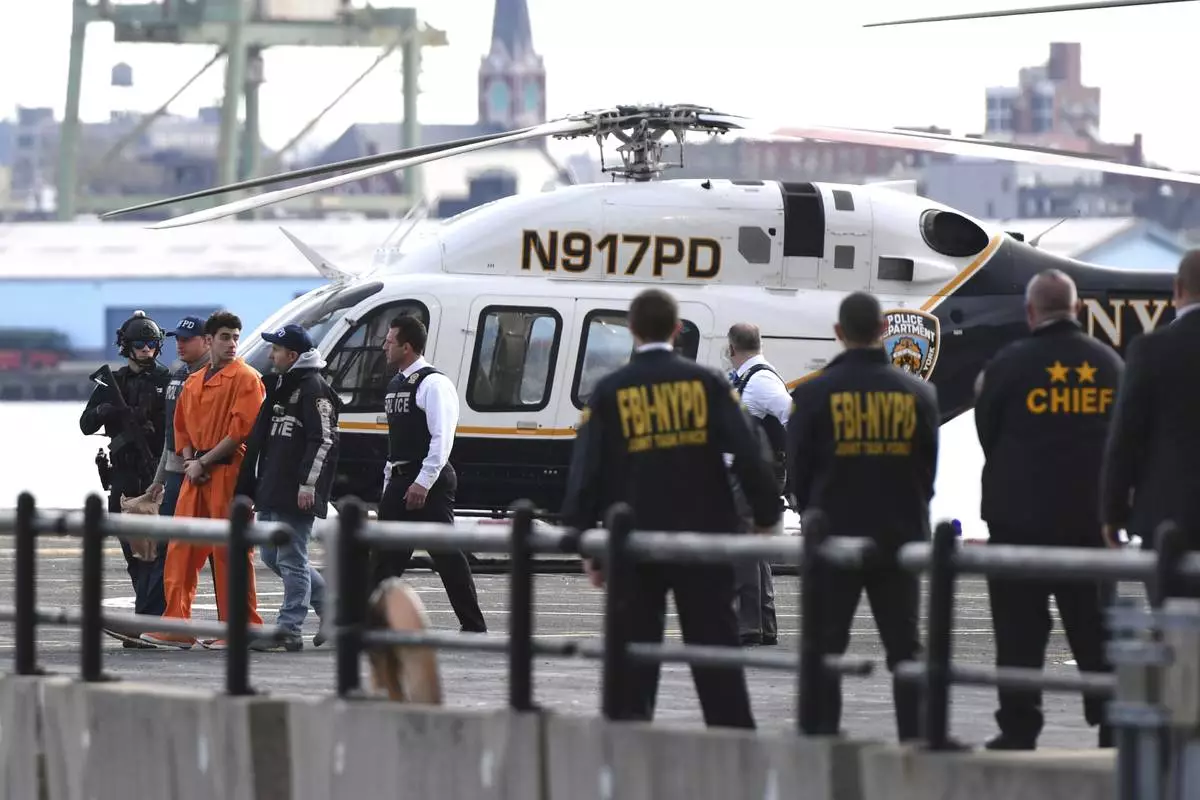
Luigi Mangione, a suspect in the fatal shooting of UnitedHealthcare CEO Brian Thompson, is escorted off of a helicopter by police, Thursday, Dec. 19, 2024, in New York. (AP Photo/Pamela Smith)
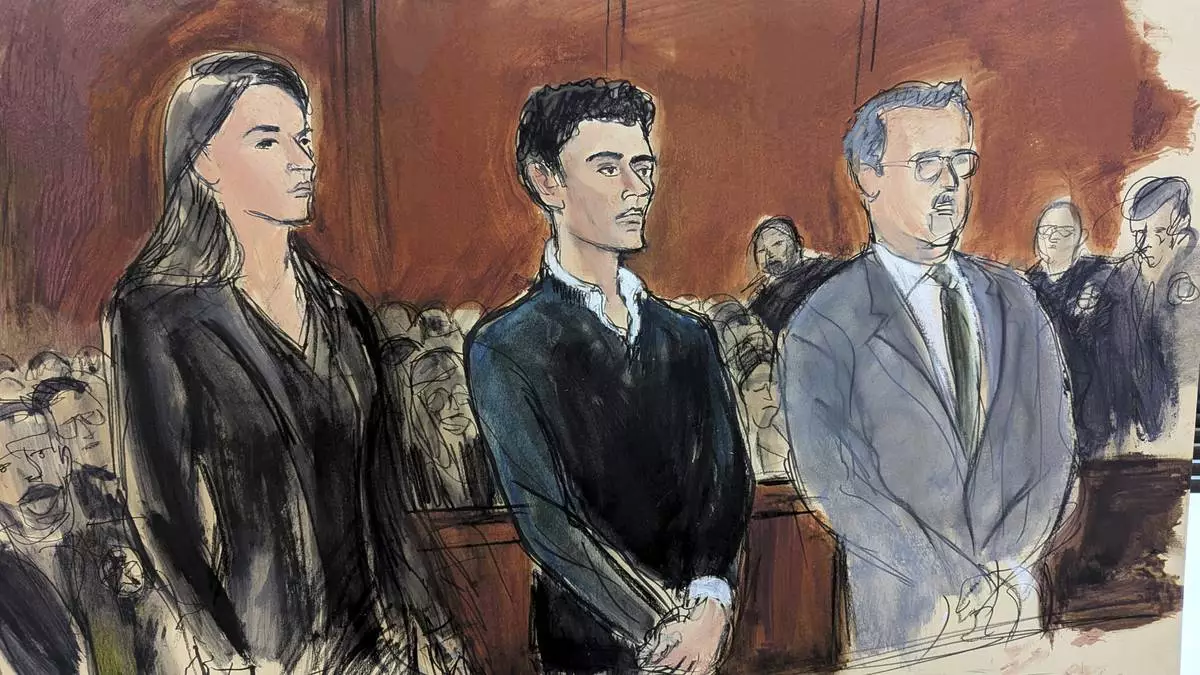
Luigi Mangione, center, stands flanked by his attorneys Karen Agnifilo, left and Marc Agnifilo, right, during his initial court appearance in Manhattan federal court, Thursday, Dec. 19, 2024, in New York. (Elizabeth Williams via AP)
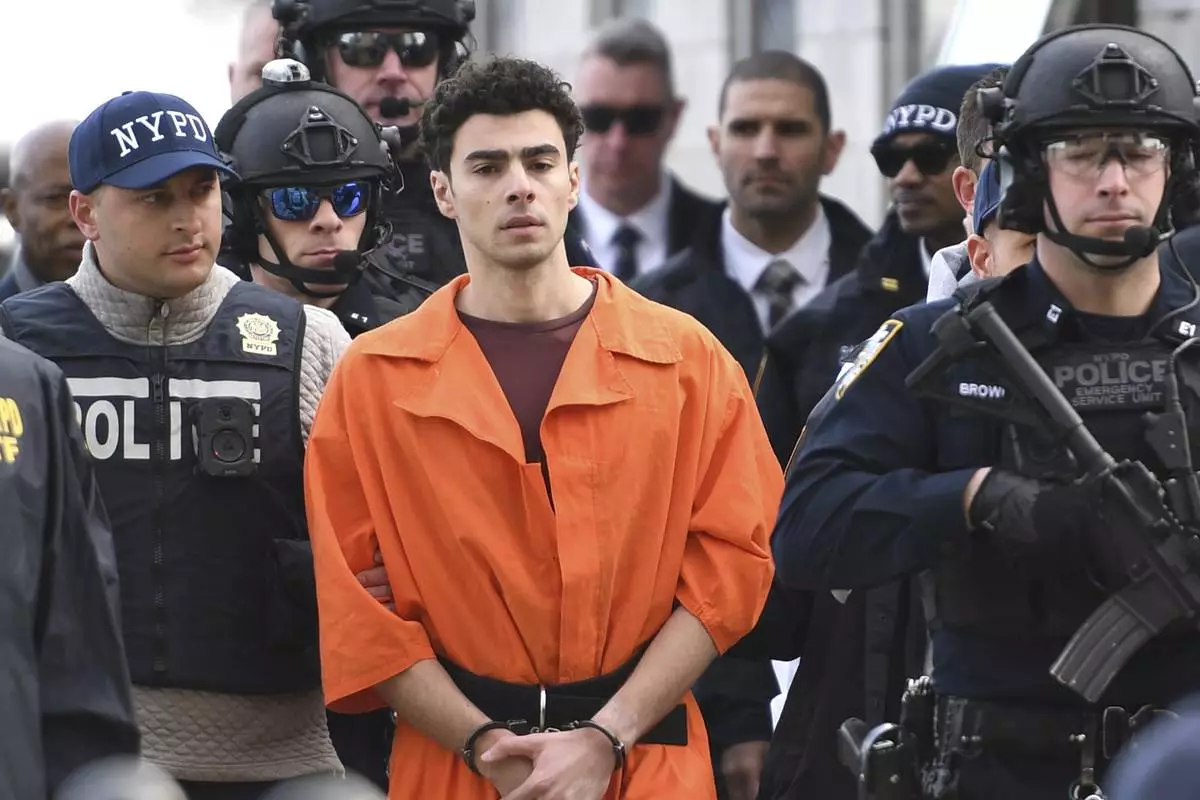
Luigi Mangione, a suspect in the fatal shooting of UnitedHealthcare CEO Brian Thompson, is escorted by police, Thursday, Dec. 19, 2024, in New York. (AP Photo/Pamela Smith)
PARIS (AP) — France’s anti-terrorism court on Friday convicted eight people of involvement in the beheading of teacher Samuel Paty outside his school near Paris four years ago, a horrific death that shocked the country.
Paty, 47, was killed by an Islamic extremist outside his school on Oct. 16, 2020, days after showing his class cartoons of the Prophet Muhammad during a debate on free expression. The assailant, an 18-year-old Russian of Chechen origin, was shot to death by police.
Those who have been on trial on terrorism charges at a special court in Paris since the end of November were accused, in some cases, of providing assistance to the perpetrator and, in others, of organizing a hate campaign online before the murder took place.
The 540-seat courtroom was packed for the verdict, which marked the final chapter of the Paty trial. Heavy surveillance was in place, with more than 50 police officers guarding the proceedings.
Seated in the front row was Samuel Paty’s 9-year-old son, accompanied by family members. As the lead judge, delivered sentences one after the other, emotions in the room ran high.
“I am moved, and I am relieved,” said Gaëlle Paty, Samuel Paty’s sister, as she addressed a crowd of reporters after the verdict. “Hearing the word ‘guilty’ — that’s what I needed."
"I spent this week listening to a lot of rewriting of what happened, and it was hard to hear, but now the judge has stated what really happened, and it feels good,” she added, her voice breaking as tears filled her eyes.
Families of the accused reacted with gasps, cries, shouts, and ironic clapping, prompting the judge to pause multiple times and call for silence.
“They lied about my brother,” shouted one relative. Another woman, sobbing, exclaimed, “They took my baby from me,” before being escorted out by police officers.
The judge met or went above most of the terms requested by prosecutors, citing “the exceptional gravity of the facts.”
Naïm Boudaoud, 22, and Azim Epsirkhanov, 23, friends of the attacker, were convicted of complicity in murder and sentenced to 16 years in prison each. Boudaoud was accused of driving the attacker to the school, while Epsirkhanov helped him procure weapons.
Brahim Chnina, 52, the Muslim father of the schoolgirl whose lies sparked the events leading to Paty’s death, was sentenced to 13 years for association with a terrorist enterprise. Prosecutors had sought 10 years for him.
Abdelhakim Sefrioui, a Muslim preacher, was given 15 years for organizing a hate campaign online against Paty.
The shocking death of the 47-year-old teacher left an indelible mark on France, with several schools now named after him.
The trial had begun in late November. The defendants were accused of assisting a perpetrator or organizing a hate campaign online in lead-up to the murder.
At the time of the attack, there were protests in many Muslim countries and calls online for violence targeting France and the satirical French newspaper Charlie Hebdo. The newspaper had republished its caricatures of the Prophet Muhammad a few weeks before Paty’s death to mark the opening of the trial over deadly 2015 attacks on its newsroom by Islamic extremists.
The cartoon images deeply offended many Muslims, who saw them as sacrilegious. But the fallout from Paty’s killing reinforced the French state’s commitment to freedom of expression and its firm attachment to secularism in public life.
Chnina's daughter, who was 13 at the time, claimed that she had been excluded from Paty’s class when he showed the caricatures on Oct. 5, 2020.
Chnina sent a series of messages to his contacts denouncing Paty, saying that “this sick man” needed to be fired, along with the address of the school in the Paris suburb of Conflans Saint-Honorine. In reality, Chnina’s daughter had lied to him and had never attended the lesson in question.
Paty was teaching a class mandated by the National Education Ministry on freedom of expression. He discussed the caricatures in this context, saying students who did not wish to see them could temporarily leave the classroom.
An online campaign against Paty snowballed, and 11 days after the lesson, Anzorov attacked the teacher with a knife as he walked home, and displayed the teacher’s head in a post on social media. Police later fatally shot Anzorov as he advanced toward them, armed.
Chnina's daughter was tried last year in a juvenile court and given an 18-month suspended sentence. Four other students at Paty’s school were found guilty of involvement and given suspended sentences; a fifth, who pointed out Paty to Anzorov in exchange for money, was given a 6-month term with an electronic bracelet.
Sefrioui, the preacher on trial, had presented himself as a spokesperson for Imams of France although he had been dismissed from that role. He had filmed a video in front of the school with the father of the student. He referred to the teacher as a “thug” multiple times and sought to pressure the school administration via social media.
Some of the defendants expressed regrets and claimed their innocence on the eve of the verdict. They did not convince Paty's family.
“It’s something that really shocks the family,” lawyer Virginie Le Roy said. “You get the feeling that those in the box are absolutely unwilling to admit any responsibility whatsoever."
“Apologies are pointless, they won’t bring Samuel back, but explanations are precious to us,” Le Roy said. "We haven’t had many explanations of the facts.”
Petrequin reported from London.

FILE - People hold a photo of the history teacher Samuel Paty , who was beheaded last week, during a memorial march in homage to him, Tuesday, Oct.20, 2020 in Conflans-Sainte-Honorine, northwest of Paris. (AP Photo/Lewis Joly, File)

FILE - French President Emmanuel Macron leaves after paying his respects by the coffin of slain teacher Samuel Paty in the courtyard of the Sorbonne university during a national memorial event, Wednesday, Oct. 21, 2020 in Paris. (AP Photo/Francois Mori, Pool, File)

FILE - A Republican Guard holds a portrait of Samuel Paty in the courtyard of the Sorbonne university during a national memorial event, Wednesday, Oct. 21, 2020 in Paris. (AP Photo/Francois Mori, Pool, File)





